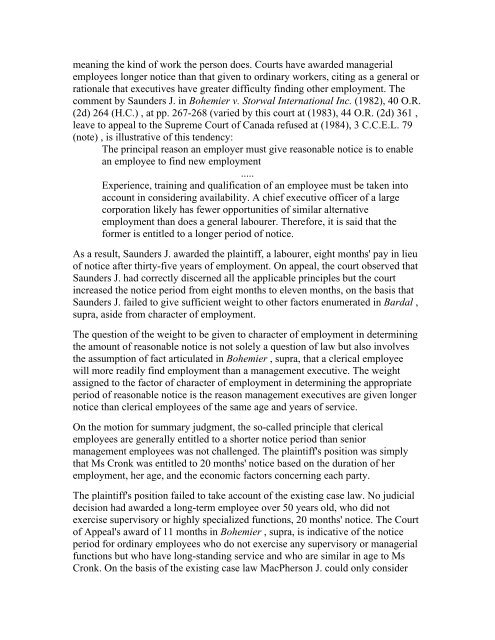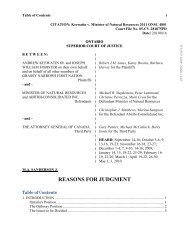Cronk v. Canadian General Insurance Co., 1995 CanLII 814 (ON CA)
Cronk v. Canadian General Insurance Co., 1995 CanLII 814 (ON CA)
Cronk v. Canadian General Insurance Co., 1995 CanLII 814 (ON CA)
You also want an ePaper? Increase the reach of your titles
YUMPU automatically turns print PDFs into web optimized ePapers that Google loves.
meaning the kind of work the person does. <strong>Co</strong>urts have awarded managerial<br />
employees longer notice than that given to ordinary workers, citing as a general or<br />
rationale that executives have greater difficulty finding other employment. The<br />
comment by Saunders J. in Bohemier v. Storwal International Inc. (1982), 40 O.R.<br />
(2d) 264 (H.C.) , at pp. 267-268 (varied by this court at (1983), 44 O.R. (2d) 361 ,<br />
leave to appeal to the Supreme <strong>Co</strong>urt of Canada refused at (1984), 3 C.C.E.L. 79<br />
(note) , is illustrative of this tendency:<br />
The principal reason an employer must give reasonable notice is to enable<br />
an employee to find new employment<br />
.....<br />
Experience, training and qualification of an employee must be taken into<br />
account in considering availability. A chief executive officer of a large<br />
corporation likely has fewer opportunities of similar alternative<br />
employment than does a general labourer. Therefore, it is said that the<br />
former is entitled to a longer period of notice.<br />
As a result, Saunders J. awarded the plaintiff, a labourer, eight months' pay in lieu<br />
of notice after thirty-five years of employment. On appeal, the court observed that<br />
Saunders J. had correctly discerned all the applicable principles but the court<br />
increased the notice period from eight months to eleven months, on the basis that<br />
Saunders J. failed to give sufficient weight to other factors enumerated in Bardal ,<br />
supra, aside from character of employment.<br />
The question of the weight to be given to character of employment in determining<br />
the amount of reasonable notice is not solely a question of law but also involves<br />
the assumption of fact articulated in Bohemier , supra, that a clerical employee<br />
will more readily find employment than a management executive. The weight<br />
assigned to the factor of character of employment in determining the appropriate<br />
period of reasonable notice is the reason management executives are given longer<br />
notice than clerical employees of the same age and years of service.<br />
On the motion for summary judgment, the so-called principle that clerical<br />
employees are generally entitled to a shorter notice period than senior<br />
management employees was not challenged. The plaintiff's position was simply<br />
that Ms <strong>Cronk</strong> was entitled to 20 months' notice based on the duration of her<br />
employment, her age, and the economic factors concerning each party.<br />
The plaintiff's position failed to take account of the existing case law. No judicial<br />
decision had awarded a long-term employee over 50 years old, who did not<br />
exercise supervisory or highly specialized functions, 20 months' notice. The <strong>Co</strong>urt<br />
of Appeal's award of 11 months in Bohemier , supra, is indicative of the notice<br />
period for ordinary employees who do not exercise any supervisory or managerial<br />
functions but who have long-standing service and who are similar in age to Ms<br />
<strong>Cronk</strong>. On the basis of the existing case law MacPherson J. could only consider
















